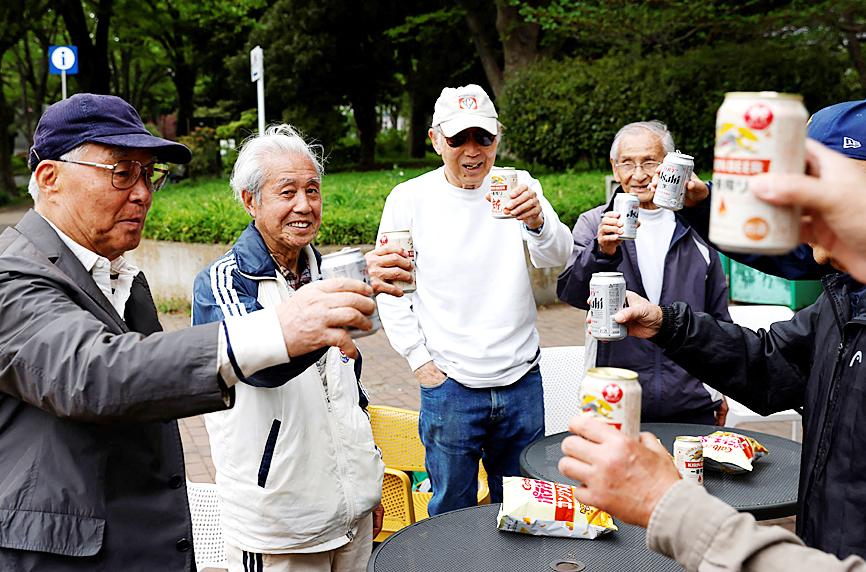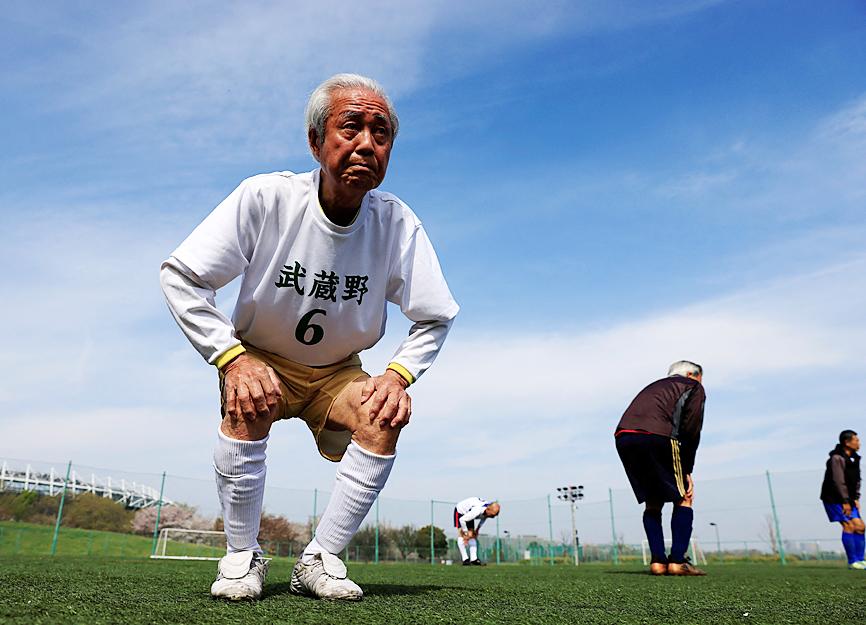Mutsuhiko Nomura’s soccer career has spanned 18 FIFA World Cups, or 70 years.
Now the silver-maned former Japan player is a member of the new over-80 division of Tokyo’s “Soccer For Life” (SFL) league, which played its first match this month.
The sprightly 83-year-old and his teammates are among a growing number of elderly people pushing the boundaries of active living in Japan.

Photo: Reuters
“When I was a kid, men in their 50s and 60s were considered ‘grandpas,’” said Nomura, who is already a member of several amateur teams, after a pre-season practice match in February. “And now, we’re all still at it in our 80s. It’s shocking.”
As Japan’s average lifespan inches up, people aged 65 or older form nearly one-third of its population of 126 million, with life expectancy, now at 85, ranking among the world’s highest.
That has brought societal changes, too. About one-fifth of those older than 70 are employed and the government encourages pensioners to start collecting later by holding out the promise of larger deferred payments.

Photo: Reuters
Elderly security guards and shopkeepers have become a common sight.
“I think the formation of the over-80 division is a reflection of what we’re seeing in Japanese society, where the elderly demographic can be active like this,” SFL league secretary general Yutaka Ito said.
It was only two decades ago that Tokyo created a division for the over-60 age group. In 2012, the over-70 division followed, and five years later, the over-75 category began.
At that rate, over-80 was simply a matter of time.
If his more “mature” teammates are something to go by, Nomura might easily have another decade on the pitch. The oldest player, Shingo Shiozawa, is 93.
“If I hadn’t played soccer, I’d have been dead by now,” said the former designer of racing cars, who plays goalie.
He credits the sport with motivating him to quit smoking and helping to speed his recovery after treatment for spinal stenosis.
However, with an average age of 83.5, stiff backs, creaky knees and labored breathing were often on display as the players of the three SFL teams slogged through inaugural matches under a blazing sun on Wednesday last week.
A ball propelled forward by a player failed to reach his slow-moving teammate, while a few stumbled and wobbled on the pitch.
An 89-year-old who ran out of breath asked to be substituted about 10 minutes into a match, unable to play the rest of the 15-minute half.
After the game, Nomura and his teammates toasted their prowess with cans of beer, in a ritual familiar to many younger players.
Despite decades of watching Nomura play soccer, his wife, Junko, says she is not concerned about injuries — only his high blood pressure, which she logs every day in a notebook, along with his activities and meals.
“He likes to eat meat, so I try to get him to eat vegetables,” she said of Nomura, who started playing soccer in school and won the national tournament three times in university.
“I think soccer is the best thing for his health,” she said.
Far from slowing down, Nomura has also taken to kicking the ball around with his daughter and granddaughter on weekends, teaching them tricks and building their love of the game.
“I sometimes go to watch the seniors play and it makes me feel I should work hard,” said Yuriko, his 48-year-old daughter. “I really admire him. I hope to be like him, and continue playing when I’m older.”

Manchester City have reached do-or-die territory in the UEFA Champions League earlier than expected ahead of what Pep Guardiola has described as a “final” against Club Brugge today. City have disproved the suggestion a new format to Europe’s top club competition would remove any jeopardy for the top clubs as Guardiola stares down the barrel of failing to make the Champions League knockout stages for the first time in his career. The English champions have endured a torrid season both in their English Premier League title defense and on the continent. A run of one win in 13 games, which included Champions League

Sumo is walking a “tightrope” as it prepares to stage events outside Japan for the first time in 20 years while also trying to preserve its ancient traditions, experts say. The sport is to hold exhibition tournaments in London in October and in Paris in June next year, the first time the Japan Sumo Association has been abroad since Las Vegas in 2005. Sports such as soccer, baseball and football play domestic games overseas in a bid to gain new fans in emerging markets. John Gunning, a former amateur sumo wrestler who commentates on the sport in English on Japanese television, says its

Oklahoma City star Shai Gilgeous-Alexander on Sunday poured in 35 points as the Thunder grabbed a bounce-back 118-108 victory in Portland to push their NBA-best record to 37-8. The Thunder, surprised by the short-handed Dallas Mavericks on Thursday, fended off a late surge from the Trail Blazers to snap their four-game winning streak. Jalen Williams scored 24 points and Isaiah Joe added 16 off the bench. Center Isaiah Hartenstein, back after a five-game absence with a calf injury, added 14 points, 11 rebounds, six assists and a big block. The Western Conference leaders were under pressure late as Portland, trailing by 15 heading

The Golden State Warriors on Wednesday withstood Oklahoma City star Shai Gilgeous-Alexander’s 52-point outburst to beat the Western Conference leading Thunder 116-109. Andrew Wiggins scored 27 points and Warriors superstar Stephen Curry scored 17 of his 21 points in the second half as Golden State erased a double-digit deficit and pulled away late for the victory. “We just stayed solid,” said Curry, who entered the contest mired in a shooting slump and had just four points on one basket in the first half. “Just all-around effort.” The Thunder, fueled by 31 first-half points from Gilgeous-Alexander, led by as many as 14 in the